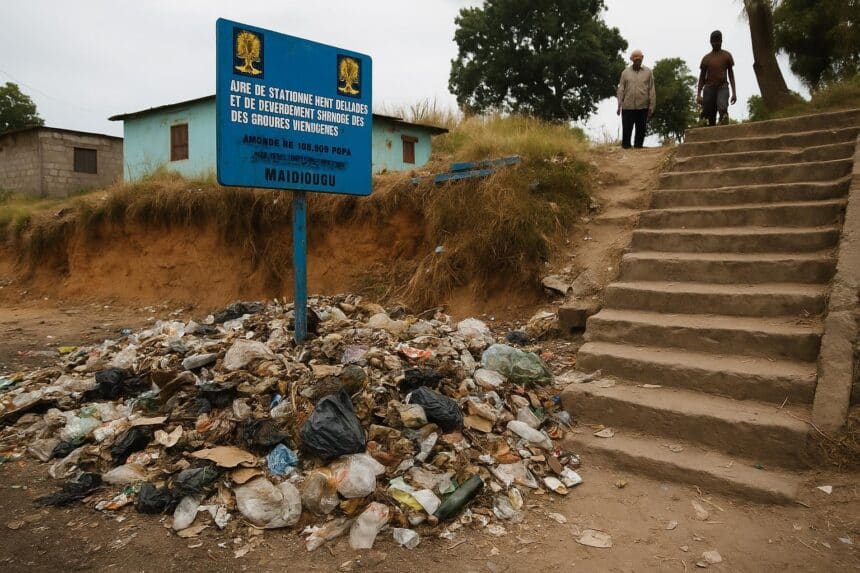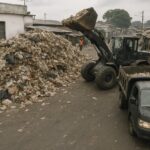Citizens on the frontline
For one Saturday morning in early September, the usually busy streets of Moungali’s quarter 42 echoed with scraping shovels instead of car horns. Residents wearing gloves and masks cleared refuse piled inside the storm water drain locals call “la Foa”.
At the front stood quarter chief Marie-Claire Bouanga, megaphone in hand, calling on neighbors to treat the area “as our common living room”. Her words launched a larger campaign that City Hall hopes will finally end illegal dumping across Brazzaville’s historic southern districts.
Officials issue firm warnings
Bouanga’s message carried a stern edge. She reminded residents that signs forbidding waste deposits already surround every collector. “This time, anyone caught throwing a single bag into the Foa will face penalties,” she warned, stressing that fines and possible detention await repeat offenders.
The crackdown targets not only households but also so-called “poubelliers”, informal collectors who empty pushcarts straight into drains to save transport costs. According to Bouanga, several have ignored repeated meetings and risk immediate transfer to the city remand center if caught again.
Such firmness, she argues, protects the heavy investments made to rehabilitate the drainage network ahead of the rainy season. “A blocked canal floods dozens of families in minutes; prevention is cheaper than repairs,” the quarter chief noted, her call echoed by municipal engineers nearby.
The cost of blocked drains
Okana Ferré Samarange, director of sanitation management, pointed to Zangadzia Bangombé in Bacongo as a cautionary tale. Despite concrete linings added last year, the collector now functions as a garbage trench, threatening to undermine its base and send stagnant water into adjacent streets.
“Every time trash clogs the culvert, we mobilise an excavator that could be resurfacing roads elsewhere,” Samarange said. Maintenance bills, he added, swallow funds meant for new footpaths, playgrounds and streetlights, slowing the city’s broader development ambitions.
Flooding linked to waste has also become a health concern. Pools of water nurture mosquitoes and bacteria, contributing to seasonal spikes in malaria and cholera, municipal doctors caution. Reducing refuse in drains therefore doubles as a public-health intervention the city cannot afford to delay.
The National Civil Protection Centre’s latest bulletin lists blocked drains among the top three causes of urban flooding emergencies wp-signup.phped last year, alongside river overflow and defective household plumbing, underscoring the importance of citizen behaviour on city safety.
Temporary solutions in place
Until permanent waste bins arrive, officials urge residents to rely on authorised door-to-door collectors trained by the General Directorate of Sanitation. These operators hand over household rubbish at transit stations, known locally as Atom, where the company Albayrack loads it onto compactor trucks.
Neighbourhoods still waiting for an Atom can use a provisional landfill at Mpila. Roger Aurélien Christian Itoua, sanitation adviser, explained that the site stays open exclusively to accredited pre-collectors, limiting uncontrolled tipping while the municipality scouts locations for additional transfer areas.
He also invited families to sweep and weed the fronts of their homes each week. “A clean frontage keeps water flowing and shows respect for your neighbour,” Itoua noted, encouraging block leaders to schedule community digs alongside mairie staff and Albayrack drivers.
Community clean-ups gain momentum
The September operation covered drains in Makélékélé, Bacongo, Moungali and Ouenzé, with volunteers ranging from students to market traders. Photographs taken on site show heaps of plastic bags removed beneath a red-painted sign reading “Defense de jeter”, highlighting the gap between regulation and practice.
Several participants said peer pressure, more than fear of fines, pushed them to join. “I used to think the canal belonged to the state,” admitted Alain Nkouka, a young mechanic. “Now I realise if it floods, the water enters my workshop first, not the mayor’s office.”
Organisers plan monthly sessions, hoping the routine will normalise proper disposal habits. They are also preparing a social-media challenge where neighbourhoods post before-and-after photos, turning cleanliness into friendly competition that celebrates the city’s colours and strengthens community pride.
What residents can do now
City Hall’s hotline 1303 remains active for reporting illegal dumps or requesting pre-collector contacts. Officials promise dispatch within 24 hours, a response time they say improves as residents supply clearer location details and work with volunteers guiding trucks through narrow lanes.
Residents renting accommodation can add waste clauses to tenancy agreements, ensuring landlords provide bins or pay collection fees. Teachers are likewise including drain-safety tips in classroom hygiene modules, reinforcing a culture where throwing a wrapper on the ground feels outdated.
With the rainy season weeks away, officials emphasise urgency. “If we act today, we avoid tomorrow’s floods,” Bouanga repeated as the last truck left Moungali. Her appeal, echoed in other arrondissements, signals a city determined to pair civic responsibility with practical support.
Residents can follow updates on the municipal Facebook page, where daily tips and clean-up dates are posted.






















